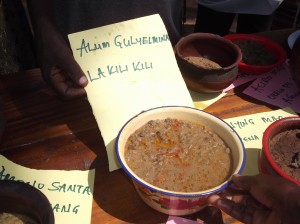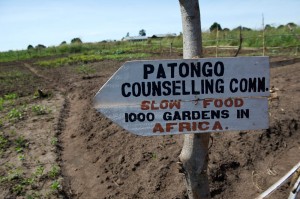It’s 10 days before Christmas, and in Uganda that means 25 degrees Celsius (77 degrees Fahrenheit). At our programme in Patongo, 200 guests gathered for singing and dancing in celebration of Terra Madre Day. Sponsored by Slow Food, Terra Madre Day promotes local foods and food culture. In Patongo, we have planted five Slow Food vegetable gardens, where people grow indigenous crops such as maize, sweet potato, millet and several types of peas. On Terra Madre Day, the women who work in the gardens sell some of their produce alongside traditional dishes such as ugali (a dough made of millet and water, meant to be dipped into vegetable or meat stew). Below is a picture of a stew made with local foodstufs.
But Terra Madre is about far more than just a one-day celebration — the Slow Food gardens’ existence is vital to the community’s recovery from the war that raged in northern Uganda for decades. Before the war, farming was a way of life for northern Uganda. But during the 20-year conflict, 90% of the population (nearly 2 million people) was displaced and forced into refugee camps, according to the Uganda Peace Foundation. Farmers abandoned their land as they fled from Joseph Kony’s Lord’s Resistance Army (LRA). While in the camps, people grew accustomed to eating only the beans and maize provided by the emergency relief programme, and agricultural skills passed down through generations were lost.
People have been returning to their homes, but the war left widespread poverty and post-traumatic stress. They lack the resources, energy and knowledge to replant their land. And their limited diet lacks nutrients important for everyone, but especially for children and those living with HIV.
The Slow Food gardens aim to change that. The gardeners have learnt about permaculture, crop variation, drying foods and other ways to maximise the benefits of the gardens. As others learn from the demonstration gardens, these practices spread throughout the community.

